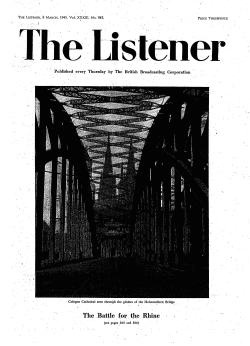The Listener, 8 March, 1945. Vol. XXXIII. No. 843 (p. 271) [.pdf]
Poetry in War Time1 For the Time Being (New York: Random House, 1944). Reed would eventually review the London edition for The Penguin New Writing, as "W.H. Auden in America" (Vol. 31, 1947).
Rupert Brooke's romantic view of war was not the reason I gave for denying him 'any particular poetic merit'. It was the reason, I suggested, for his popularity. Mr. Richards has, however, lost sight of what he first wrote to ask. He is now, with Major Hunter, out in the open, developing a broader and more familiar theme: that modern poetry is, for the most part, uninspired, ungifted, shapeless, formless, artificial, adolescent and as often as not hysterical. The Muse has withdrawn herself. Reasons? None.
Nor indeed have Major Hunter's and Mr. Richards's predecessors in past centuries ever been able to suggest a reason for the perennial absurdity of the contemporary. For it must not be thought that it is a new situation they are deploring. 'Q's' [Arthur Quiller-Couch (Bartleby.com)] grandfather, reading a poem of Tennyson, described it as 'prolix and modern'. There is nothing to show that years earlier the Lyrical Ballads of Wordsworth and Coleridge were less coldly received. We know what the Quarterly thought of Keats. And it is inconceivable that to the conservative the later versification of Shakespeare can have seemed uncouth to those brought up on Marlowe. One cannot unconvince this point of view; one can only point out that it is immemorial. Reasons? One only: that it is an ineradicable human belief (so great is our fear of the creative) that only the dead are harmless and praiseworthy. Is it insignificant that Mr. Richards selects for a meagre praise only Keyes and Lewis from among those I wrote about; and that those two poets are the only ones who are dead?
There is only one other point I wish to refer to: when Major Hunter and Mr. Richards demand 'finish', they are not really disagreeing with me, as they will see if they can bear the to re-read the second of my articles. There are, however, different opinions as to what constitutes finish, and I am arrogant enough to believe I can usually distinguish between the bitterly-achieved artistry of the true poet (however original), and the glibness of the pasticheur; and impolite enough to doubt if, judging from their admiration for Brooke, they can. I must add that I believe 'pattern, form and finish' to be only part of poetry; to put them at their highest they are only co-equal with what poetry has to say. I do not believe, with Major Hunter, that 'to turn a commonplace sentimentality into poetry is the mark of a poet'; I believe that sentimentality and commonplace will corrupt even the brightest gifts, and that, setting aside the charm of light verse, the best poetry is the repository, not of platitude and banality, but of wisdom.
May I be allowed to add that since writing my last letter I have read the American edition of Mr. Auden's verse and prose commentary on 'The Tempest',1 and that I share almost all of Mr. Geoffrey Grigson's warm and understandable enthusiasm for it?
BletchleyHenry Reed








